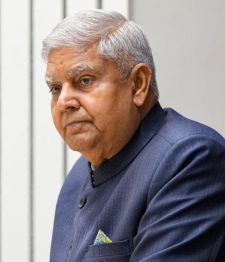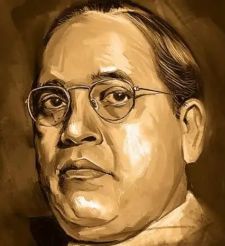Inside the ideological war to erase India’s pluralist identity.
EVEN AS THE country faces serious problems like acute unemployment, rising inflation, poor industrial output, deteriorating law and order, increasing drug addiction, threats from neighbouring countries, and a host of other challenges, our politicians continue to raise inconsequential issues — perhaps to divert public attention.

The latest in the series is the raking up of the issue relating to the words ‘secular’ and ‘socialist’ inserted in the preamble of the Constitution. What harm these words cause, and what would be achieved by removing them, is difficult to fathom.
The controversy was first raised by RSS General Secretary Dattatreya Hosabale, who sought a discussion on whether the words ‘socialist’ and ‘secular’, added to the Constitution’s preamble by the Indira Gandhi government during the Emergency, should be omitted.
Vice President Jagdeep Dhankhar, who likes to remain in the headlines and has often waded into controversies — including during his tenure as the Governor of West Bengal — took little time to jump into the fray.

VP Jagdeep Dhankhar
He escalated the issue by claiming that the insertion of the additional words into the preamble as part of the 42nd Constitutional Amendment in 1976 amounted to “sacrilege to the spirit of Sanatan.”
The Vice President, who is also the Rajya Sabha chairman and is supposed to remain above party politics, went on to claim that the insertion of the two words was nothing short of being a “nasoor” (festering wound):
“The addition of these words in the preamble during the Emergency signals a betrayal of the mindset of the framers of the Constitution. It is nothing but belittling the civilisational wealth and knowledge of this country for thousands of years.”
Hosabale’s comments were promptly endorsed by Union Ministers Shivraj Chauhan and Dr Jitendra Singh. Naturally, Assam Chief Minister Himanta Biswa Sarma could not lag behind and claimed that ‘socialism’ and ‘secularism’ were Western concepts, asserting that these words “have no place in Indian civilisation.”
It is evident that these gentlemen would not have said what they did without a nudge from the top — either from the RSS or the government.
It is interesting to note that the Janata Party government, which came to power after the Emergency and included the Jansangh (the earlier avatar of the BJP), reversed many other changes made to the Constitution through the 42nd Amendment but retained the words ‘socialist’ and ‘secular’.
The Atal Bihari Vajpayee-led BJP government and other non-Congress governments over the years, too, did not consider removing the two words.

PM Modi and HM Amit Shah
Not only that, Union Home Minister Amit Shah, who was BJP president when the Narendra Modi government stormed to power in 2014, had said on record a year later:
“The BJP believes that the preamble, as it stands today, should remain. There is no need to change it.”
He was responding to a question about government advertisements showing the original version of the Constitution.
So what has changed now? What has prompted this flurry of statements, and what can possibly be achieved by omitting these words?
The fact is that even if the two words were not part of the preamble — they are not part of the Constitution itself but only of the preamble — the entire Constitution is permeated with the spirit of these two ideals. These include the Fundamental Rights and the Directive Principles of State Policy, which all speak of equality and prohibit discrimination on the basis of caste, creed, or colour.

India is not merely a country; it is a subcontinent with huge diversity, not just in physical features but also in culture, language, and traditions.
According to the 2001 Census of India, the country has 122 major languages and 1,599 other languages, including 22 scheduled languages. Dialects and customs change every few hundred kilometres.
 The latest census figures also show that Hindus dominate with about 80 per cent of the population, while the remaining 20 per cent — including Muslims (14.5 per cent), Sikhs, Christians, Buddhists, Jains, and others — belong to other religions. We are all very proud of our heritage and culture, where diversity is celebrated.
The latest census figures also show that Hindus dominate with about 80 per cent of the population, while the remaining 20 per cent — including Muslims (14.5 per cent), Sikhs, Christians, Buddhists, Jains, and others — belong to other religions. We are all very proud of our heritage and culture, where diversity is celebrated.
And, pray, what could be the objection to the word socialist? Are we a capitalist nation? If we are not a socialist welfare state, why does half our population depend on government doles, including rations?
Ironically, Jagdeep Dhankhar read out a statement by Dr Ambedkar to bolster his argument, but he might need to read it again.

Dr B R Ambedkar
Sharing his concern, the founding father of our Constitution had said:
“My anxiety is deepened by the realisation of the fact that, in addition to our old enemies in the form of castes and creeds, we are going to have many political parties with diverse and opposing political creeds… Will Indians place the country above their creed? Or will they place creed above the country?… I do not know, but this much is certain: if the parties place creed above country, our independence will be put in jeopardy a second time and probably lost forever. This eventuality we must all regularly guard against.” ![]()
________
Also Read:
APPLAUSE TO ACCUSATIONS: The Trials of a Turbaned Star in Modern India
Disclaimer : PunjabTodayNews.com and other platforms of the Punjab Today group strive to include views and opinions from across the entire spectrum, but by no means do we agree with everything we publish. Our efforts and editorial choices consistently underscore our authors’ right to the freedom of speech. However, it should be clear to all readers that individual authors are responsible for the information, ideas or opinions in their articles, and very often, these do not reflect the views of PunjabTodayNews.com or other platforms of the group. Punjab Today does not assume any responsibility or liability for the views of authors whose work appears here.
Punjab Today believes in serious, engaging, narrative journalism at a time when mainstream media houses seem to have given up on long-form writing and news television has blurred or altogether erased the lines between news and slapstick entertainment. We at Punjab Today believe that readers such as yourself appreciate cerebral journalism, and would like you to hold us against the best international industry standards. Brickbats are welcome even more than bouquets, though an occasional pat on the back is always encouraging. Good journalism can be a lifeline in these uncertain times worldwide. You can support us in myriad ways. To begin with, by spreading word about us and forwarding this reportage. Stay engaged.
— Team PT

